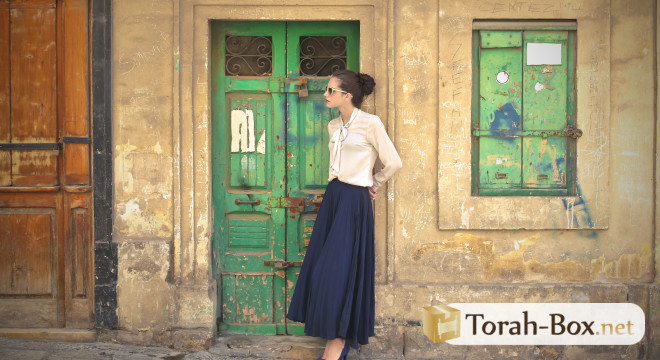
Women
3 Myths about Tzniut: Only a Matter of Long Skirts?
There seems to be a series of widespread myths within the Jewish world in general, and even within the Orthodox world. That is the definition of Tzniut and how it manifests itself. Some philosophies about Tzniut are erroneous and require explanation so that Jewish women understand the very essence of this mitzvah. The three myths presented below are taken from the book Outside Inside: A Fresh Look at Tzniut, written by Gila Manolson.
Myth 1: Tzniut Is Only a Dress Code
I'm sure you've already been asked the question: "Do you dress Tzniut? Meaning, do you wear skirts that cover your knees and long sleeves (even in the summer at 40 degrees)?!
When asking this question, one ignores an essential aspect of the concept of Tzniut: that of the energy one releases, and the attitude with which one behaves and expresses oneself.
Indeed, modesty requires that the exterior be a perfect reflection of the interior. We hope that, through our actions and behavior, the Neshama will be visible first and foremost. When Adam and Chava were created, Hashem gave them the ability to see each other as they truly were.
Thus, when the man looked at his wife, he was able to perceive her mind, her heart, and her soul, and the same was for the woman towards her husband (We know that this is far from being the case today...). After the sin, both Adam and Chava lost this ability. When they looked at each other, the soul and the body no longer formed a united entity as before, but rather, two distinct entities.
The Torah seeks to make women into princesses; and thus Tzniut, both clothing and comportment, is the means to achieve this and to make a Tikun (reparation) for the original sin. We should regard Tzniut in dress as a coronation; it is only a manifestation of the inner Tzniut that we cultivated beforehand.
Myth 2: Tzniut Only Applies to Women
A second, well known myth is that Tzniut is only for women. Women must cover themselves and make themselves small, while men have all the liberties. This is false! In fact, the concept of Tzniut applies to both men and women, but in different ways. Man's Yetzer Hora is to look, while a woman's Yetzer Hora is to be looked at.
These are two distinct Avodot (works). A woman must seek to be seen for who she is, not for what she wears. A man, meanwhile, must seek to see a woman, not as a physical object, but as a dignified person with feelings, strengths and weaknesses.
As far as dress code itself is concerned, this is relevant for both women as well as men. While a woman must wear knee-length skirts and long-sleeved tops, a man must also wear clean clothes, no holes, nor tight fitted clothes ... Have you ever seen a rabbi walk around in a bathing suit?!
Myth 3: Tzniut Is to Avert the Gaze of Men
If you hear someone argue that the main reason a woman needs to dress Tzniut is to avert the eyes of men, know that this is a great mistake! This person is wrong! Modesty is above all a demonstration of self-respect. It seeks to value the person for who he is, not for his physical appearance.
It is obvious, however, that man's look is important, and that it represents one of the reasons why woman dress with Tzniut, but it is not the first reason. In no instance should a woman "flee" or "hide" from a man. A man has the ability to control his impulses, and that is exactly why Hashem put him in this world: for him to elevate himself and work on himself.
To conclude, the concept of Tzniut is far from easy to understand, and even more to implement. It is full of details and nuances, and worthy of constant study. But know, men and women, that it is the best way to become great, to attain respect, and, above all, to be an ambassador worthy of the name of Hashem and His Torah.
May we have the opportunity to fulfill the mitzvah of Tzniut to the best of our abilities, both in our clothing and in our behavior!
Torah-Box.net Account
To access the entire Torah-Box.net website, sign up for free in less than a minute.
Weekly Parsha
 Candle Lighting - New York
Candle Lighting - New York
Friday December 19th, 2025 at 16:13 *Shabbat ends at 17:17 *
change my location
* Times given as an indication, check the times of your community








